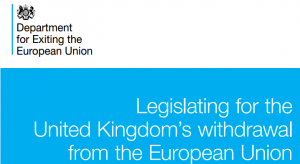By Prof Phil Syrpis, Professor of EU Law (University of Bristol Law School)
 In her letter to Donald Tusk the Prime Minister outlined the UK’s starting position in negotiations with the EU. The EU Council of Ministers responded by producing draft negotiating guidelines (to be confirmed by the European Council at the end of April). These guidelines create the framework within which negotiations on withdrawal, and those on the future relationship between the UK and the EU, will occur. Meanwhile, a White Paper on the Great Repeal Bill was presented to Parliament, promising on the one hand to repeal the European Communities Act (ECA) and end the supremacy of EU law in the UK, and on the other to convert the acquis communautaire into UK law, so that ‘EU-derived rights’ (as we will need to get used to calling them) will, as far as possible, be unaffected.
In her letter to Donald Tusk the Prime Minister outlined the UK’s starting position in negotiations with the EU. The EU Council of Ministers responded by producing draft negotiating guidelines (to be confirmed by the European Council at the end of April). These guidelines create the framework within which negotiations on withdrawal, and those on the future relationship between the UK and the EU, will occur. Meanwhile, a White Paper on the Great Repeal Bill was presented to Parliament, promising on the one hand to repeal the European Communities Act (ECA) and end the supremacy of EU law in the UK, and on the other to convert the acquis communautaire into UK law, so that ‘EU-derived rights’ (as we will need to get used to calling them) will, as far as possible, be unaffected.
The opening exchanges between the UK and EU have generated a lot of comment. Much of it has focused on the unlikely subject of Gibraltar (Michael Howard’s crass evocation of the Falklands conflict will have done nothing to lower simmering tensions). In relation to the White Paper, most attention has been devoted to the role of Parliament and the devolved assemblies. Rather less attention has been paid to many of the EU law aspects. In this short note, I focus on those. I first consider what new light has been shed on the way in which the Article 50 negotiations will proceed, drawing attention to the host of issues which remain unanswered. I then consider the EU law questions raised by the repeal of the ECA, and the conversion of the acquis into UK law. Michael Ford has already commented on this blog on the applicability of judgments of the European Court of Justice in the post-Brexit era; so there is no more on that subject here.
My overarching concern is that the Government, in particular in the White Paper, has failed to provide a clear sense of the size of the task which lies ahead. It is impossible to know whether this is because the Government itself does not appreciate the magnitude of the challenge, or because it is trying to conceal the difficulties. The Government has, for months, struggled to articulate just what Brexit might mean, and has made a series of disparate promises which a range of different constituencies have, if so minded, been able to rely on, or cling to. It will now start making hard choices. It has not prepared the ground well. (more…)



